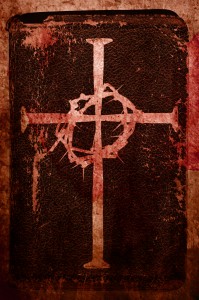The Plot Thickens
 If you’re an avid reader (or at least want to be an avid reader, like me), then you’ve inevitably experienced a plot twist. Perhaps it was the unexpected death of a main character, or a betrayal of allegiances, or discovering the reality that the narrative was from the perspective of the bad guy instead of the hero.
If you’re an avid reader (or at least want to be an avid reader, like me), then you’ve inevitably experienced a plot twist. Perhaps it was the unexpected death of a main character, or a betrayal of allegiances, or discovering the reality that the narrative was from the perspective of the bad guy instead of the hero.
Whatever the case may be, the plot twist is a celebrated function of literature. The Bible, as literature, is no exception to using this literary device. But what no one saw coming was the first plot twist. It takes place at the fourth and fifth words[1] of the first verse of the first chapter of the first book.
As you open your Bible, if you intend on reading it straight through, the words you first encounter are, “In the beginning, God created…” These five words contain two important truths that set the stage for the rest of Scripture: God is, and God acts.
God Is
The premise behind all of Scripture is that God is a God who exists. He’s not merely myth or philosophical theory. That probably should go without saying, but I think we underestimate the importance of establishing that fact.
 In Ex. 3, God is commissioning Moses to deliver the Israelites out of Egypt. In verse 13, Moses says to God, “If I come to the people of Israel and say to them, ‘The God of your fathers has sent me to you,’ and they ask me, ‘What is his name?’ what shall I say to them?”
In Ex. 3, God is commissioning Moses to deliver the Israelites out of Egypt. In verse 13, Moses says to God, “If I come to the people of Israel and say to them, ‘The God of your fathers has sent me to you,’ and they ask me, ‘What is his name?’ what shall I say to them?”
God responds, “I AM WHO I AM.” And he said, “Say this to the people of Israel, “I AM has sent me to you.’ ”
At the very core of God’s identity is his existence. The fact that he is there makes up who he is. That might not make any sense at first, but digging into Scripture a bit further reveals why this is so important.
In a section subtitled in our English translations “The Folly of Idolatry”, Isaiah naturally speaks about the foolishness of idolatry. As he concludes his thought, he writes this: “No one considers, nor is there knowledge or discernment to say, ‘Half of it I burned in the fire; I also baked bread on its coals; I roasted meat and have eaten. And shall I make the rest of it an abomination? Shall I fall down before a block of wood.”[2]
The reality of the existence of God is constantly juxtaposed against the unreality and unacceptability of idol worship. This is why the First Commandment states, “Thou shalt have no other gods before me.” Other religions with other gods don’t present different options than Yahweh of the Bible. They present counterfeits of the real thing, thus making idolatry a fraudulent activity.
When we read in Gen. 1:1, “In the beginning, God…” we aren’t reading that a God exists. We’re reading that the God exists.
God Acts
But we mustn’t stop there. If we just acknowledge the existence of God, we leave the door open for more false teaching. If we stop at “In the beginning, God…”, Deism and Theism get to share the stage with Christianity. That’s not what God intended at all.
The next word changes all that – “In the beginning, God created…” God is a God who is, but also a God who acts, who does. This is profound.
We’re not left to leave God off in a back room, aloof and indifferent to the universe around him. We’re not capable of being satisfied with an impersonal god like the Force in Star Wars. We have a God who acts…who creates.
Back to Isaiah: “Behold, the LORD’s hand is not shortened, that it cannot save, or his ear dull, that it cannot hear.”[3]
This is probably where we are permitted to make our grand entrance. God sets the stage in Gen. 1:1 by revealing himself to be a God who is and a God who acts. He then goes about the business of acting by creating everything around us – including us. The rest of biblical (and human) history is the story of our questioning God’s ability to act (and ultimately his existence – see Ps. 14:1).
In the Garden of Eden, Adam and Eve question God’s authority and his ability to tell the truth. After the Exodus, the Israelites repeatedly question God’s ability to provide. The enemies of Israel question God’s ability to deliver his people. Each one of our sins is ultimately a question of God’s sovereignty – God’s ability to reign as ruler of the universe.
Even Mary, the mother of Christ, questions the plan of God to reveal a Savior when she says, “How will this be, since I am a virgin?” God’s gracious and gentle answer through the angel Gabriel brings us back to where we started: “The Holy Spirit will come upon you, and the power of the Most High will overshadow you; therefore the child to be born will be called holy – the Son of God…For nothing will be impossible with God.”[4]
God is and God acts.
These words are fulfilled in Jesus Christ. God is – here he is, right there in front of and next to people just like you and me. God acts – he lives, breathes, eats, teaches, heals, dies, and rises again.
These words are fulfilled in Jesus Christ for you. God is – here he is, right there, in, with, and under the bread and wine on the altar before you on Sunday morning. God acts – he is crucified for you; he dies in your place; he rises again to give you life; he forgives you; he saves you.
God is and God acts.
It turns out that as God begins his word, he’s really setting the stage for redemption.
[1] At least in the ESV English translation.
[2] Isa. 44:19
[3] Isa. 59:1
[4] Luke 1:34-37
